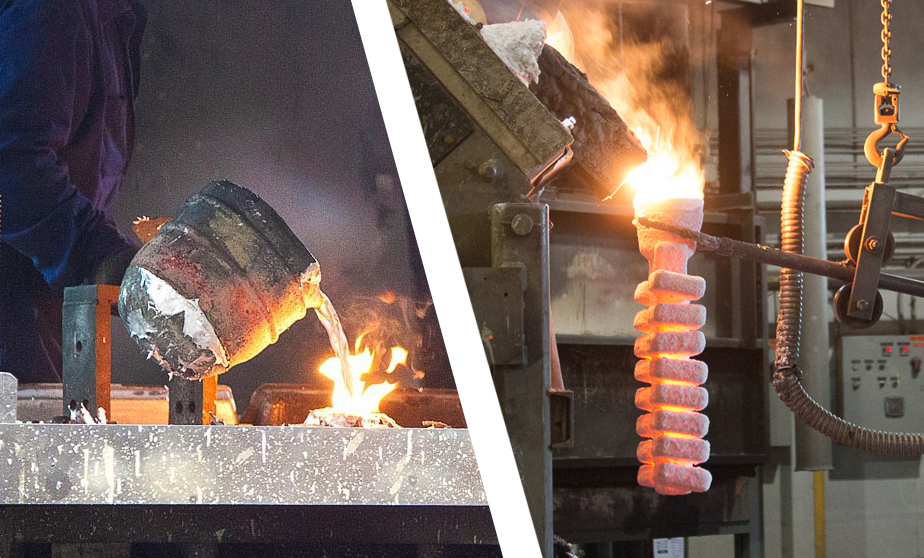Stahl Specialty Company Fundamentals Explained
Stahl Specialty Company Fundamentals Explained
Blog Article
Stahl Specialty Company Can Be Fun For Anyone
Table of ContentsSome Known Questions About Stahl Specialty Company.Stahl Specialty Company Fundamentals ExplainedStahl Specialty Company Can Be Fun For EveryoneThe smart Trick of Stahl Specialty Company That Nobody is Talking AboutStahl Specialty Company Can Be Fun For Anyone
The refined distinction hinges on the chemical content. Chemical Comparison of Cast Light weight aluminum Alloys Silicon advertises castability by decreasing the alloy's melting temperature and enhancing fluidity during spreading. It plays a crucial function in allowing intricate molds to be filled up accurately. In addition, silicon adds to the alloy's toughness and use resistance, making it important in applications where sturdiness is crucial, such as auto parts and engine parts.It additionally improves the machinability of the alloy, making it much easier to process into finished items. In this way, iron adds to the overall workability of aluminum alloys.
Manganese contributes to the stamina of light weight aluminum alloys and improves workability. It is typically used in functioned light weight aluminum products like sheets, extrusions, and accounts. The visibility of manganese aids in the alloy's formability and resistance to breaking during manufacture processes. Magnesium is a lightweight component that gives strength and impact resistance to aluminum alloys.
It permits the manufacturing of lightweight components with superb mechanical residential properties. Zinc boosts the castability of aluminum alloys and assists regulate the solidification process during spreading. It improves the alloy's toughness and firmness. It is usually located in applications where elaborate forms and great information are required, such as ornamental spreadings and specific automotive parts.
The Definitive Guide to Stahl Specialty Company
Because aluminum-silicon alloys have good spreading buildings, high gas buildings, straightforward processes, and superb corrosion resistance, aluminum-silicon alloys are most typically used in the die-casting industry at home and abroad. At the very same time, aluminum-silicon alloys are likewise fairly very early and commonly acknowledged alloys created and made use of in die-casting. After continuous research study and improvement, the majority of the existing global mainstream aluminum-silicon alloys have actually been finalized and are absolutely nothing greater than A356, A360, A380, ADC12, B390, and A413.
The primary thermal conductivity, tensile strength, yield toughness, and prolongation differ. Amongst the above alloys, A356 has the greatest thermal conductivity, and A380 and ADC12 have the least expensive.

See This Report about Stahl Specialty Company
In precision casting, 6063 is well-suited for applications where detailed geometries and top notch surface coatings are vital. Examples include telecommunication enclosures, where the alloy's superior formability permits for smooth and cosmetically pleasing styles while keeping structural honesty. In the Illumination Solutions sector, precision-cast 6063 elements create sophisticated and reliable lighting components that require elaborate forms and excellent thermal performance.
(https://fliphtml5.com/homepage/stahlspecialc)
It leads to a better surface coating and much better deterioration resistance in A360. In addition, the A360 exhibits remarkable elongation, making it suitable for facility and thin-walled elements. In accuracy casting applications, A360 is fit for sectors such as Customer Electronics, Telecommunication, and Power Tools. aluminum metal casting. Its boosted fluidity enables complex, high-precision components like smart device coverings and communication device real estates.

In accuracy casting, light weight aluminum 413 beams in the Consumer Electronic Devices and Power Tools industries. This alloy's remarkable corrosion resistance makes it an excellent choice for outdoor applications, making sure long-lasting, long lasting items in the discussed markets.
Indicators on Stahl Specialty Company You Need To Know
The light weight aluminum alloy you select will substantially influence both the casting process and the homes Check This Out of the final item. Because of this, you have to make your decision meticulously and take an informed strategy.
Figuring out one of the most suitable light weight aluminum alloy for your application will suggest considering a vast range of characteristics. These relative alloy characteristics adhere to the North American Die Spreading Association's standards, and we've separated them into 2 categories. Foundry. The initial classification addresses alloy features that affect the production process. The 2nd covers attributes influencing the residential properties of the end product.
The alloy you pick for die spreading straight affects a number of aspects of the casting procedure, like just how easy the alloy is to work with and if it is susceptible to casting problems. Warm breaking, also called solidification cracking, is a normal die spreading defect for aluminum alloys that can lead to interior or surface-level rips or cracks.
7 Simple Techniques For Stahl Specialty Company
Specific aluminum alloys are more susceptible to warm breaking than others, and your selection needs to consider this. Foundry. It can harm both the actors and the die, so you should look for alloys with high anti-soldering residential or commercial properties.
Corrosion resistance, which is currently a significant feature of aluminum, can differ significantly from alloy to alloy and is a vital characteristic to think about depending upon the ecological conditions your item will be exposed to. Use resistance is another property frequently sought in light weight aluminum products and can set apart some alloys.
Report this page